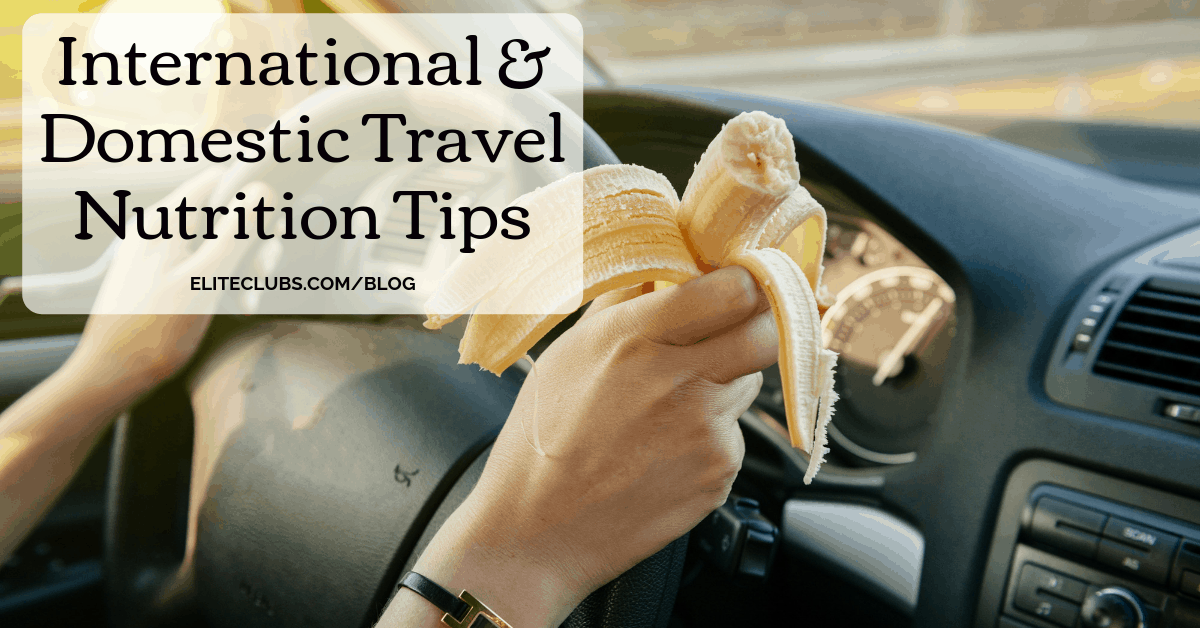
Have a big trip coming up? Whether you’re driving or flying, traveling domestic or abroad, you still have to eat. Your destination will determine what foods are available or if you have the ability to bring your own. Here are some travel nutrition tips!
Domestic Travel
The car is packed, the suitcase is ready, itinerary is set…but what about food and snacks? Follow these tips and tricks to help you eat right during your domestic travel plans:
- Clean your produce
- Wash and rinse fresh produce before packing.
- Keep cold food cold
- Pack cold food in coolers with ice or ice packs to prevent the growth of bacteria.
- Beverages should be packed in one cooler and perishable foods in another.
- Pass on packing hot food
- Unless you have the ability to travel with a portable heating unit, you will not be able to keep hot foods at the appropriate temperature.
- Pack healthy non-perishable snacks
- Whole or dried fruit
- Freeze-dried vegetables
- Nuts (pre-portioned into bags)
- Nut butters (travel packs)
- Whole-grain pretzels, crackers, and bread sticks
- Trail mix
- Snack bars (made with whole grains, nuts, fruit and few added sugars)
- Pack hand sanitizer and disinfectant wipes
- These can come in handy for quickly washing hands or eating surfaces.
- Choose wisely at drive-thrus and casual restaurants
- Pick items that are grilled, steamed, broiled, or baked over items that are fried or sautéed.
- Try a salad with lean protein and a vinaigrette dressing.
- Watch your portions – enjoy a single burger patty and forgo the special sauces, order from the kid’s menu, or pick water over soda.
Be sure to also keep food safety in mind while you are out and about on your next adventure:
- Clean hands before you eat
- There are germs everywhere at the airport, train station, bus station, etc. so it is vital to always wash hands.
- Ideally, you would wash hands with soap and water, but hand sanitizer can be used in a pinch.
- Be safe with water
- When in doubt, drink sealed, bottled sources of water over tap or well water
- Also be aware of ice and other drinks made with water as they can just as easily be contaminated.
- Remember the two-hour rule
- If you purchase hot or cold food, be sure to consume it within two hours of the purchase time to avoid bacterial growth.
- Think before eating
- Never place food directly on public surfaces and try to disinfect table tops or airplane tray tables prior to eating.
- Try not to be enticed by the delicious aromas of street vendors for food safety – the same goes for buffets.
Choose healthier snacks in the airport terminal:
- Mozzarella cheese stick
- Whole-grain sandwich with lean meat, veggies, and mustard
- Salad with a lean protein such as chicken
- Vegetable soup
- Fruit cup or yogurt parfait
- Pre-cut veggies (pair with a travel nut butter or hummus from home)
International Travel
You have probably spent a decent amount of time planning out the activities and excursions for your trip, so don’t forget about food safety when traveling internationally. Follow these tips to avoid illness and contamination:
- Plan ahead
- Research your destination to plan for any anticipated issues related to food and water supply.
- Check the altitude as children and others can become dehydrated and sick at higher altitudes.
- Visit your Primary Care Physician before you go
- Check for any recommended vaccines or boosters.
- Talk to your doctor about recommendations for over-the-counter medications for diarrhea, heartburn, or gas. Access to these may be limited or non-existent.
- Pack smartly
- Carry hand sanitizer and disinfectant wipes to clean eating surfaces and wash hands in a pinch.
- Wash hands often, ideally with soap and warm water.
- Pack extra nonperishable, non-liquid food items in your carry-on for healthy snacks on the plane.
- Keep your guard up
- Opt for sealed, bottled beverages over tap water.
- This includes water for ice, cocktails, and water used to brush teeth.
- Don’t be overly adventurous with your food choices.
- It may be safest to avoid exotic dishes like bat, unusual wild game and monkey, no matter how curious you are.
- Opt for sealed, bottled beverages over tap water.
- Err on the side of caution
- Avoid consuming raw meat, fish, shellfish, and eggs as you can become ill from undercooked or contaminated foods and beverages.
- Avoid raw produce (including salads) because these foods may have been washed and rinsed using contaminated water.
- Thoroughly cooked produce or those with a thick peel you do not consume, well-cooked meat, poultry and fish, and dairy from large commercial dairies are considered safe by the FDA.
- Take care of yourself
- Stay hydrated and seek help if you feel you need medical treatment.
Feeling unprepared for your trip? Want to know what foods you should avoid? Meet me for a FREE fitness consultation and we can discuss your current eating habits to see what works best for you!
Schedule a Nutrition ConsultationWritten by Sarah Brunner, RDN, CD; Elite Sports Clubs Registered Dietitian
Sarah is certified in food allergies/intolerances and nutritional counseling, Academy of Nutrition and Dietetics; has a certificate in Dietetics from Mount Mary University; and a BA in Education and Mathematics from the University of Wisconsin – La Crosse.
